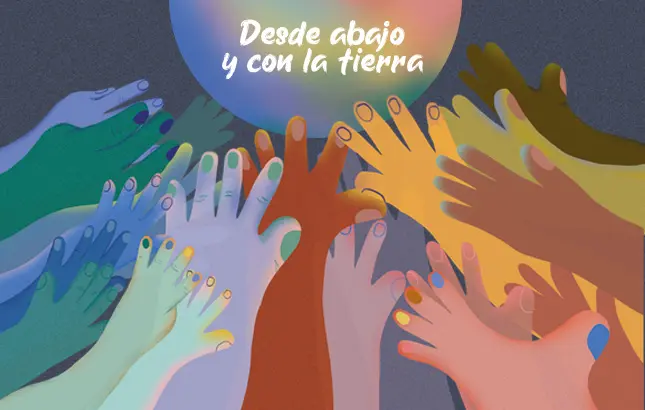In the second half of 2023, the Movimiento Político Rebelión Verde in El Salvador (ReverdES)* led and coordinated a consultative and collaborative process with ninety-five organizations throughout El Salvador that involved the participation of more than five hundred young people, including feminists, environmentalists, people with disabilities, LGBTQI+ people, sex workers, indigenous people, Afro-descendants, and community leaders.
The consultation and the resulting National Youth Agenda for Climate and Environmental Justice, from Below and with the Earth, arose from the urgent need to better understand the reality of El Salvador, to study it, and to build a proposal that would allow youth to cooperate politically to transform their realities by devising a roadmap based on up-to-date information about of the state of affairs in the different territories of El Salvador.
The consultation made it possible to address urgent issues affecting the Salvadoran youth, and it also contributed different youth sectors getting to know each other, coming together, and conversing. It was a meeting point to begin a national process of articulation rooted in the concerns they have about their future.
We know that this civilizing model, this capitalist system, this neoliberal model is robbing us of absolutely everything. It is robbing us of life; it is robbing us of our soul; it is robbing us of our future; it is robbing us of hope. We, young people, are undoubtedly concerned about this and have decided to take action through the National Youth Agenda for Climate and Environmental Justice.
Adriana Ramírez, member of ReverdES.
The Agenda
The National Youth Agenda for Climate and Environmental Justice has six points that integrate the dialogues, reflections, and discussions that arose during the consultation process. All these experiences, their diversity and richness, are reflected in it. The first result has been the generation of a space for articulation and the creation of tools for action.
The six sections of the Agenda were written as policies because young people recognize the urgency of materializing their demands through public policies in order to have a real impact at the national level:
| Sovreign foreign policy |
|
| Zero Hunger Policy |
|
| Transforming the Territories to Sustain Life Policy |
|
| National Affordable Housing Policy |
|
| Marine policy for the protection and sustainable use of the country’s sea coastal zone |
|
| Policy for mainstreaming the rights of women, indigenous people, Afro-descendants, sex and gender diverse people, people with disabilities, and youth. | Implement public policies and programs for the valorization and democratization of care work, the eradication of gender-based violence and discrimination, the centering of sex and gender diverse people, indigenous and afro-descendant populations, and people with disabilities, the enjoyment of a full life in harmony with nature, guaranteed access to reproductive and non-reproductive health as well as care protocols in health and climate emergencies. |
The Agenda was presented in the context of the campaign for the 2024 presidential elections. It was clear then that the candidates and whoever came to power would likely ignore it, and this realization moved the young people who participated in the consultation process to state their candid political proposals in the face of empty political campaigns.
However, the purpose of the Agenda was not to remain a proposal, limited to an electoral period to then be shelved, but to become a political, communication, and advocacy tool for the next five years, after which the consultation process would take place again because circumstances and living conditions do not remain static.
Lessons
Adriana shares with us some of the lessons that emerged from the consultation process and working together in the creation of the Agenda: One of the biggest lessons was the fact that we opened ourselves to complex situations in service of the process in order to build an agenda that was as complete and disruptive as possible. Involving the majority of the population in the construction and consultation processes was difficult and required a lot of time, but it was totally worth it, since this inclusive process was in itself a disruption of the patterns that have led us to the crisis we find ourselves in. It was also very important to get out of our comfort zone, because we usually speak with the same people. Getting out of the bubble of individual struggles allowed us to build links with other struggles and find the elements that unite us. Another of our achievements is that the process was informed and carried out by young people, which allowed us to reclaim our strength, capacity for action, and our will to build a fairer world that can hold many more worlds.
We are currently experiencing a civilizational crisis, that is, the crisis of a model of society-making, of a capitalist, patriarchal system that has led to the severe deterioration of living conditions. There is less water, less land and lower-quality air. Life continues to be pauperized, not only in economic but also in ecological terms. We are confronted with a panorama of great injustices, especially for communities that capitalism, patriarchy, and colonialism see as sacrifice zones, that is, as areas of poor development. It is the people of these communities who bear the brunt of capitalist development, and are consequently deprived of the so-called benefits that its projects generate.
| * Movimiento Político Rebelión Verde de El Savador (ReverdES) is made up of young women and men who build spaces of struggle and resistance. They also accompany communities facing socio-environmental conflict, which threatens them with disposition, brought about mainly by touristic and urban development projects. |
Cover illustration:
Ana Filipa dos Santos Lopes
Facebook: @fineacts.co
Instagram: @fineacts
Twitter: @fine_acts
Ana is @analogictinker

